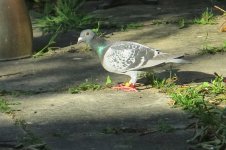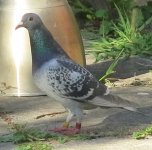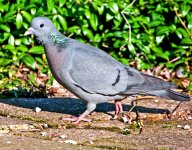hi there
Just photographed this chap in the back of my garden in Bedford (the untidy bit LOL) about an hour ago
Is it a Stock Dove or a 'captive' Dove of sorts .
.
I see it has the white embellishment on top of its bill :t:
I see that it has a red ring band on one leg and a yellow ring band on the other -
Are used ring bands ever brightly coloured if they are wild birds?
Just photographed this chap in the back of my garden in Bedford (the untidy bit LOL) about an hour ago
Is it a Stock Dove or a 'captive' Dove of sorts
I see it has the white embellishment on top of its bill :t:
I see that it has a red ring band on one leg and a yellow ring band on the other -
Are used ring bands ever brightly coloured if they are wild birds?
Attachments
Last edited:






